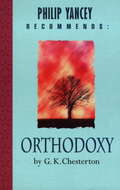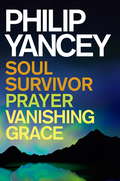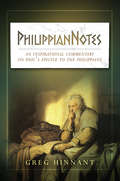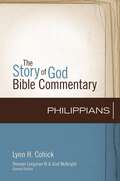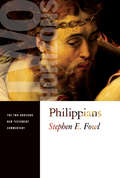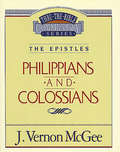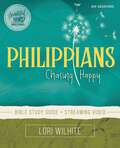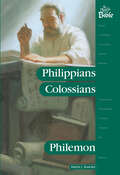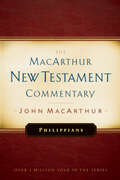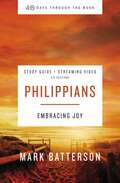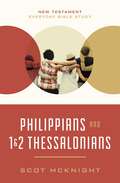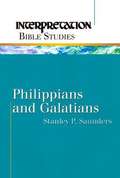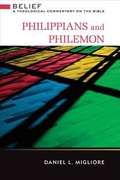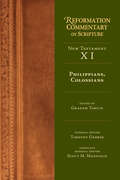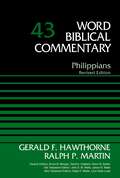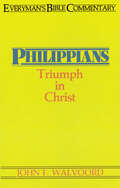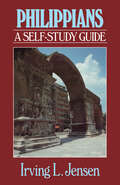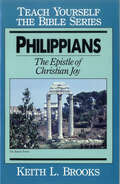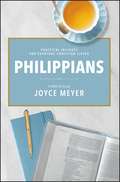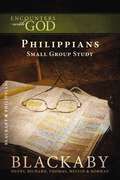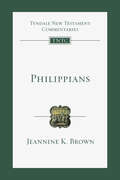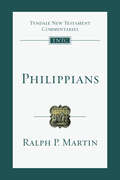- Table View
- List View
Philip Yancey Recommends: Orthodoxy
by G K Chesterton'Why anyone would pick up a book with that formidable title eludes me,' writes Philip Yancey of G. K. Chesterton's Orthodoxy. 'But one day I did so and my faith has never recovered. I was experiencing a time of spiritual dryness in which everything seemed stale, warmed over, lifeless. Orthodoxy brought freshness and, above all, a new spirit of adventure.''We direly need another Chesterton today, I think. In a time when culture and faith have drifted even further apart, we could use his brilliance, his entertaining style, and above all his generous and joyful spirit. He managed to propound the Christian faith with as much wit, good humour and sheer intellectual force as anyone in this century.'Since its first publication in 1908, this classic work has represented a pivotal step in the adoption of a credible faith by many other Christian thinkers, including C. S. Lewis. Written as a spiritual autobiography, it stands as a remarkable and inspirational apologetic for Christianity.
Philip Yancey: Soul Survivor, Prayer, Vanishing Grace
by Philip YanceyYancey's lifelong writing career has always focused on the search for honest faith that makes a visible difference for a world in pain. In his landmark book What's So Amazing about Grace? he issued a benchmark call for Christians to be as grace-filled in their behaviour as they are in asserting their beliefs.This collection sets out Yancey's search for a life enhanced by faith instead of diminished by religion. Having struggled to forge personal convictions about God amid the ironies of life and the incongruities of religion, he looks closer at those whose lives radiate spiritual authenticity rather than pious posturing.From Dostoevsky to Martin Luther King, G. K. Chesterton to Paul Brand, Yancey pays homage to some of the most remarkable, selfless, Christ-like lives our world has known, and asks what both he and we can do to find such beautiful faith in our own lives. Multi-award winning spirituality writer Philip Yancey is loved throughout the world for his honest, insightful and inspirational writing.
PhilippianNotes: A Commentary on Paul's Epistle to the Philippians
by Greg HinnantGreg Hinnant, one of Creation House&’s most prolific authors, presents an intimate exposition of the Book of Philippians, thoroughly exploring its author, audience, and historical context. PhilippianNotes strikes the right balance, offering content that is both theologically precise and emotionally stirring, making this commentary a valuable resource for pastors and teachers and a very understandable and motivational study for every believer. As with all his books, Hinnant&’s teaching tone is respectful, personal, and pastoral. He has approached this epistle with devotion and scholarship, interweaving his personal insights with the collective wisdom of a host of Christian writers, scholars, and theologians. Numerous biblical references and thought-provoking footnotes are provided for those desiring further study. PhilippianNotes is a uniquely insightful, informative, and moving tapestry of transformational truth and wisdom. It will deepen your appreciation for the apostle Paul, his teachings, and all that God accomplished in and through him—and desires to do in and through us.
Philippians (The Story of God Bible Commentary)
by Tremper Longman III Scot Mcknight Lynn H. CohickEmphasizing the historical distance between the New Testament and contemporary culture, Philippians—part of the new, highly-anticipated Fidei Commentary series on the New Testament—provides pastors, students, Sunday School teachers, and lay people a clear and compelling exposition of the text in the context of the Bible’s overarching story. The authors move away from “application” language, which has been criticized as being too simplistic, instead encouraging discussion of how the Bible’s story can be lived today. Offering a new type of application commentary for today’s context, the Fidei series explains and illuminates Scripture as God’s Story, with each New Testament text examined as embedded in its canonical and historical setting, in order to foster discernment in living the story faithfully and creatively with and for the Church in the 21st Century
Philippians (The Two Horizons New Testament Commentary)
by Stephen E. FowlIn this fine new commentary on Paul's letter to the Philippians, Stephen Fowl notes that for the great premodern commentators of the Christian tradition, the literal sense of Scripture is always regulated by theological concerns. Thus, unlike commentaries that simply append theology to historical criticism, Fowl's volume displays disciplined attention to the text of Philippians in ways that enhance rather than frustrate theological inquiry. While Fowl engages the great scholars of the past, John Chrysostom and Thomas Aquinas among them, he also draws a novel theology of friendship from Paul's letter and unpacks how the teachings of Philippians might be embodied today by Christians in the West.
Philippians / Colossians: The Epistles (Thru the Bible)
by J. Vernon McgeeRadio messages from J. Vernon McGee delighted and enthralled listeners for years with simple, straightforward language and clear understanding of the Scripture. Now enjoy his personable, yet scholarly, style in a 60-volume set of commentaries that takes you from Genesis to Revelation with new understanding and insight. Each volume includes introductory sections, detailed outlines and a thorough, paragraph-by-paragraph discussion of the text. A great choice for pastors - and even better choice for the average Bible reader and student! Very affordable in a size that can go anywhere, it's available as a complete 60-volume series, in Old Testament or New Testament sets, or individually.
Philippians Bible Study Guide plus Streaming Video: Chasing Happy (Beautiful Word Bible Studies)
by Lori WilhiteDISCOVER THE HAPPINESS YOU&’VE BEEN CHASINGMany of us spend our lives chasing happy through relationships, success, and the next adventure. Yet, we only discover a dryness in our souls. Why? Because we&’re chasing the wrong kind of happy. We chase temporary happiness instead of the eternal happiness found in Jesus.Sometimes, we wonder if God wants us to be happy. Someone said that God cares more about our holiness than our happiness like the two are disconnected. But what if the pursuit of happiness was adjacent to the pursuit of holiness?The problem isn&’t that God doesn&’t want us to be happy. The problem is that we&’re chasing happy in the wrong things. Happiness is ours when we chase God&’s joy, His purpose, His unity, His contentment, and His peace. Happy is captured when we chase Him.If you&’ve ever struggled with laying hold of true happiness, this study is for you! Discover the incredible truth that happy isn&’t found in the circumstances around us, but the power of Jesus in us.This study guide includes:Individual access to six streaming video talks from LoriGroup discussion questions and an opening group activity for each sessionIn-depth personal Bible study between sessionsReading plan through the entire book of PhilippiansScripture memory cards and coloring pagesSESSIONS AND VIDEO RUN TIMES:Chasing Joy (24:00)Chasing Purpose (21:30)Chasing Unity (23:00)Chasing Jesus (21:30)Chasing Peace (21:30)Chasing Contentment (20:00)This study guide has everything you need for a full Bible study experience, including:The study guide itself—with discussion and reflection questions, video notes, and a leader's guide.An individual access code to stream all video sessions online. (You don&’t need to buy a DVD!)Streaming video access code included. Access code subject to expiration after 12/31/2028. Code may be redeemed only by the recipient of this package. Code may not be transferred or sold separately from this package. Internet connection required. Void where prohibited, taxed, or restricted by law. Additional offer details inside.
Philippians Colossians Philemon (The People's Bible)
by Harlyn J KuschelWhat is the book of Philippians about in the Bible? What is the book of Colossians about in the Bible? Who was Philemon?The apostle Paul wrote these books of the Bible while he was in prison. Philippians is a warm, personal letter expressing great joy in Christ. Paul wrote to the Colossians to help them understand Christian truth and ward off false teaching. Philemon is a short note to Paul’s friend, asking him to forgive a runaway slave who had become a Christian.Want to learn more? If you’re wondering what the books of Philippians, Colossians, and Philemon are all about, this helpful resource is for you!Philippians, Colossians, Philemon is a reliable Bible commentary. It’s down to earth, clearly written, easy to read and understand, and filled with practical and modern applications to Scripture.It also includes the complete text of the books of Philippians, Colossians, and Philemon from the NIV Bible. The Christ-centered commentaries following the Scripture sections contain explanations of the text, historical background, illustrations, and archaeological information. Philippians, Colossians, Philemon is a great resource for personal or group study!This book is a part of The People’s Bible series from Northwestern Publishing House.
Philippians MacArthur New Testament Commentary: Christ, The Source Of Joy And Strength (MacArthur New Testament Commentary Series #21)
by John MacArthurPhilippians is the most personal letter Paul wrote to a church. In it, he addresses many challenging aspects of the Christian life such as joy, humility, and spiritual unity. Respected preacher and Bible teacher, John MacArthur, presents yet another comprehensive and compelling commentary in his New Testament Series. Readers will find this resource indispensable for their study of this excellent epistle.
Philippians MacArthur New Testament Commentary: Christ, The Source Of Joy And Strength (MacArthur New Testament Commentary Series #21)
by John MacArthurPhilippians is the most personal letter Paul wrote to a church. In it, he addresses many challenging aspects of the Christian life such as joy, humility, and spiritual unity. Respected preacher and Bible teacher, John MacArthur, presents yet another comprehensive and compelling commentary in his New Testament Series. Readers will find this resource indispensable for their study of this excellent epistle.
Philippians Study Guide plus Streaming Video: Embracing Joy (40 Days Through the Book)
by Mark BattersonDo you need a shot of joy or a boost of holy optimism in your life? Join pastor Mark Batterson in this video Bible study of Paul's most emotional letter that will help you fix your eyes on Jesus and know that you can do all things through Christ because the tomb is empty!This Study Guide includes:Individual access to 6 streaming video sessionsPersonal study between sessions40 Day reading plan through PhilippiansLeader&’s GuideIn this 40 Days Through the Book video Bible study, Mark Batterson serves as a tour guide on Paul's letter to the Philippians. Paul, writing from a jail cell, speaks of joy, gratitude, unity, and purpose. Learn both the content and the context of the letter and then how you can directly apply the message to your daily life.Join Mark on a journey through Paul's letters to the Philippians that connects the dots between this letter filled with joy and your Christian walk by...Having a vision for the future and offering praise before it happensPraying like the answer depends on God to follow-throughHow to initiate heaven invading earthStanding together as a Church in one Spirit and one purpose, andFinding out what we really sign-up for when we follow JesusThe 40 Days Through the Book series is designed to help you actively engage with God's Word. Each study encourages you to read through selected books in the New Testament at least once during the course of the study. As. You do, you will gain (1) an understanding of the background and culture of the book or letter, (2) insights into key passages that you might have overlooked before, and (3) clear takeaways that you can apply today to your life.Sessions include:A Love Letter (Philippians 1:1-8)There You Are (Philippians 1:9-26The Creative Minority (Philippians 1:27-30)Attitude Check (Philippians 2:1-30)Live Not by Lies (Philippians3:1-21)The Focusing Illusion (Philippians 4:1-23)Designed for use with the 40 Days Through the Book: Philippians Video Study (sold separately).*Access code subject to expiration after 12/31/2026. Code may be redeemed only by the recipient of this package. Code may not be transferred or sold separately from this package. Internet connection required. Eligible only on retail purchases inside the United States. Void where prohibited, taxed, or restricted by law. Additional offer details inside.
Philippians and 1 and 2 Thessalonians (New Testament Everyday Bible Study Series)
by Scot McKnightIn his letter to the Philippians, Paul expresses many of his ideas about how Christians should live life together. His words on fellowship and upright conduct are carried over into his letters to the Thessalonians, in which Paul exhorts the church to live in a way that pleases God. Philippians and the Thessalonians all address believers in the first century and in the twenty-first century with words that are practical and deeply spiritual:Philippians appeals for unity and rejoicing in the face of suffering.1 and 2 Thessalonians emphasize having a heart of thanksgiving and also discuss the return of Christ.Kingdom living is the shape of life in Christ. These letters have taught Christians since the first century to live a life shaped by confidence in what God has promised us, but also to live that life without trying to escape from this world.Exploring the links between the Bible and our own times, McKnight shares perspectives that reveal the enduring relevance of these Pauline letters for our lives today. Ideal for personal reflection or group study, Philippians and 1 & 2 Thessalonians will help you see God in the biblical context so you can hear from God in your context.In the New Testament Everyday Bible Study Series, widely respected biblical scholar Scot McKnight combines interpretive insights with pastoral wisdom for all the books of the New Testament. Each volume provides:Original Meaning. Brief, precise expositions of the biblical text and offers a clear focus for the central message of each passage.Fresh Interpretation. Brings the passage alive with fresh images and what it means to follow King Jesus.Practical Application. Biblical connections and questions for reflection and application for each passage.
Philippians and Galatians
by Stanley P. SaundersThe letters to the Philippians and to the Galatians both illustrate the passion and intesnity fo Paul's writing. The letter to the Philappians is perhaps Paul's warmest letter, using the language of partnership, joy and humility. Galatians, in contrast, reveals frustion and anger and lacks the expression of thanksgiving typically found near the beginning of Paul's letters. Together these writings provide a compelling portrait of a theologian of rare power and insight whose legacy continues to spark lively debate in the church today.
Philippians and Philemon
by Daniel L. MiglioreIn this latest volume in the Belief series, Daniel L. Migliore plumbs the depth of Paul's letters to the Philippians and to Philemon. With splendid theological reflection, Migliore explores central themes of these remarkable letters--themes that include the practice of prayer, righteousness from God, and the work of reconciliation and transformation through Jesus Christ. Migliore shows how Philippians continues to speak to churches that, like the church at Philippi, struggle to be faithful to Christ, worry about the future, and need guidance. And in Philemon, Migliore finds a letter with importance far beyond its size--a letter that can enrich our understanding of the fullness of the gospel that Paul proclaims. In both books, Migliore deftly shows Paul as a remarkable theologian and pastor with a message instructive to the church of every age.
Philippians, Colossians (Reformation Commentary on Scripture Series #Nt Volume 11)
by Graham TomlinPreachingPaul's letters to the Philippians and Colossians celebrate the glory and supremacy of Jesus Christ and his saving work, a refrain that the reformers never grew tired of singing. While their tones are diverse, the clarity of their compositions and the power of their voices still reverberate today.Reformation commentators found the main themes of these Pauline letters deeply applicable to their circumstances, and volume editor Graham Tomlin urges that they are just as relevant to our own: Philippians overflows with thanksgiving in the midst of persecution and trials; Colossians defends the superiority of Jesus as Lord over all principalities and powers. For the Reformers as well as for Paul, all goodness and grace flows from Christ in whom "all the fullness of God was pleased to dwell" (Col 1:19), the Son who "made himself nothing" (Phil 2:7) in order to bring many daughters and sons to glory.This volume assembles a diverse chorus spanning place, time, and confessional differences: from Italian Reform-minded Catholic Gasparo Contarini and German Lutheran Martin Chemnitz, to Dutch Anabaptist Menno Simons, to French Reformed Theodore Beza and English Puritan Richard Sibbes. Scholars and pastors alike will find many fruitful insights from these and a number of other significant figures--most of whom enjoy fresh translations from the original, many for the first time in English.
Philippians, Volume 43: Revised Edition (Word Biblical Commentary)
by Bruce M. Metzger Ralph P. Martin Lynn Allan Losie David Allen Hubbard Glenn W. Barker John D. Watts James W. Watts Gerald F. HawthorneThe Word Biblical Commentary delivers the best in biblical scholarship, from the leading scholars of our day who share a commitment to Scripture as divine revelation. This series emphasizes a thorough analysis of textual, linguistic, structural, and theological evidence. The result is judicious and balanced insight into the meanings of the text in the framework of biblical theology. These widely acclaimed commentaries serve as exceptional resources for the professional theologian and instructor, the seminary or university student, the working minister, and everyone concerned with building theological understanding from a solid base of biblical scholarship. <P><P>Overview of Commentary Organization Introduction—covers issues pertaining to the whole book, including context, date, authorship, composition, interpretive issues, purpose, and theology.Each section of the commentary includes:Pericope Bibliography—a helpful resource containing the most important works that pertain to each particular pericope. Translation—the author’s own translation of the biblical text, reflecting the end result of exegesis and attending to Hebrew and Greek idiomatic usage of words, phrases, and tenses, yet in reasonably good English.Notes—the author’s notes to the translation that address any textual variants, grammatical forms, syntactical constructions, basic meanings of words, and problems of translation.Form/Structure/Setting—a discussion of redaction, genre, sources, and tradition as they concern the origin of the pericope, its canonical form, and its relation to the biblical and extra-biblical contexts in order to illuminate the structure and character of the pericope. <P>Rhetorical or compositional features important to understanding the passage are also introduced here.Comment—verse-by-verse interpretation of the text and dialogue with other interpreters, engaging with current opinion and scholarly research.Explanation—brings together all the results of the discussion in previous sections to expose the meaning and intention of the text at several levels: (1) within the context of the book itself; (2) its meaning in the OT or NT; (3) its place in the entire canon; (4) theological relevance to broader OT or NT issues.General Bibliography—occurring at the end of each volume, this extensive bibliography contains all sources used anywhere in the commentary.
Philippians- Everyman's Bible Commentary: Triumph In Christ (Everyman's Bible Commentaries)
by John WalvoordIt seems unlikely that a chained prisoner would write a paper on triumph, but in his letter to the Philippian believers, the apostle Paul did exactly that. John F. Walvoord's refreshing analysis of this popular New Testament epistle combines an unusually fascinating style with a careful exegesis of the original Greek text. After discussing the epistle's authorship, date, character, and relevance to modern Christianity, Walvoord moves to a consideration of prominent phrases in the Pauline writings. Additionally, cross-references and historical background help to explain the text to the layman or student. Learn how the principles expressed by the apostle Paul can help Christians today to consistently experience peace in Christ.
Philippians- Everyman's Bible Commentary: Triumph In Christ (Everyman's Bible Commentaries)
by John WalvoordIt seems unlikely that a chained prisoner would write a paper on triumph, but in his letter to the Philippian believers, the apostle Paul did exactly that. John F. Walvoord's refreshing analysis of this popular New Testament epistle combines an unusually fascinating style with a careful exegesis of the original Greek text. After discussing the epistle's authorship, date, character, and relevance to modern Christianity, Walvoord moves to a consideration of prominent phrases in the Pauline writings. Additionally, cross-references and historical background help to explain the text to the layman or student. Learn how the principles expressed by the apostle Paul can help Christians today to consistently experience peace in Christ.
Philippians- Jensen Bible Self Study Guide (Jensen Bible Self-Study Guide Series)
by Irving L. JensenThis self-study guide will introduce you to the church at Philippi, where Paul maintained a close and unique relationship with the people who supported him spiritually and financially. Out of a heart of gratitude he wrote them a thank-you letter while imprisoned at Rome. In it Paul describes one of the most important and poignant teachings regarding Jesus Christ. In the second chapter he discusses kenosis—the self-imposed humiliation that typified the life of the Lord as a humble servant, whose obedience went as far as an undeserved sacrificial death for humanity.If you are looking for a comprehensive, challenging tool to use in personal, group, or class Bible study, you will find the Jensen Bible Self-Study series an exciting way to better understand the important truths of God's Word. Each response-oriented guide in the 39-book series features helpful charts, graphs, maps, and ideas for projects and further study. You will refer back to each completed guide as a reference again and again as you study the Scriptures. This study series has enabled millions to effectively explore and understand God's eternal message, and it continues to be a widely-used tool for Bible study today.
Philippians- Jensen Bible Self Study Guide (Jensen Bible Self-Study Guide Series)
by Irving L. JensenThis self-study guide will introduce you to the church at Philippi, where Paul maintained a close and unique relationship with the people who supported him spiritually and financially. Out of a heart of gratitude he wrote them a thank-you letter while imprisoned at Rome. In it Paul describes one of the most important and poignant teachings regarding Jesus Christ. In the second chapter he discusses kenosis—the self-imposed humiliation that typified the life of the Lord as a humble servant, whose obedience went as far as an undeserved sacrificial death for humanity.If you are looking for a comprehensive, challenging tool to use in personal, group, or class Bible study, you will find the Jensen Bible Self-Study series an exciting way to better understand the important truths of God's Word. Each response-oriented guide in the 39-book series features helpful charts, graphs, maps, and ideas for projects and further study. You will refer back to each completed guide as a reference again and again as you study the Scriptures. This study series has enabled millions to effectively explore and understand God's eternal message, and it continues to be a widely-used tool for Bible study today.
Philippians- Teach Yourself the Bible Series: The Epistle of Christian Joy (Teach Yourself the Bible)
by Keith BrooksThe Teach Yourself the Bible Series is one of the best New Testament studies you will find anywhere. Each book in the series is packed full of valuable questions on individual chapters of the Bible, check-ups to test your grasp of scriptural truths, and usable suggestions for group study.Grow in your knowledge of God through each New Testament book, then go on to study six aspects of Christianity essential for all believers: doctrine, prayer, eternal life, prophecy, Christian character, and Bible study.The church at Philippi was Paul's first established in Europe and one for whom he felt special affection. Study this warm letter to the Philippian believers and learn from the problems they encountered as a growing congregation.Strengthen your relationship with the living God with all twenty-five books of the Teach Yourself the Bible Series. Each volume is a timeless, yet practical, study of the Word of God.
Philippians: A Biblical Study
by Joyce MeyerInternationally renowned author and Bible teacher Joyce Meyer provides a close study on Philippians, emphasizing the true joy that comes from serving others through Christ.Paul's letter to the people at Philippi serves as a reminder that if we search for joy in possessions, places, or people, we will always come up short. True, lasting joy comes only through faith in Jesus Christ, living in harmony with His followers, and serving others in the name of Christ. The life lived by the Philippians is still attainable today. In her comprehensive approach, Joyce Meyer takes a deep dive into well-known and beloved verses, identifying key truths and incorporating room for personal reflection.Joyce's Philippians provides a key study tool that will help you develop a stronger relationship with God. If you take time to examine His word, you'll see how much He loves you and how much He desires that you live a joyful, content life on earth!
Philippians: A Blackaby Bible Study Series (Encounters with God)
by Henry BlackabyIntended as companions to the Blackaby Study Bible, these guides also stand alone as a complete study of a book of the Bible.The lessons include: Leader's Notes7 studies based on reference materials included in the Blackaby Study BibleAn explanation and interpretation of Scripture A story that illustrates the passage in focus Other Bible verses related to the theme Questions for reflection Suggestions for application in everyday life.
Philippians: An Introduction and Commentary (Tyndale New Testament Commentaries #Volume 11)
by Jeannine K. BrownThe letter to the Philippians illuminates a warm relationship between the apostle Paul and the Philippian believers.
Philippians: Based On The Revised Standard Version (Tyndale New Testament Commentaries #Volume 11)
by Ralph P. MartinPaul's letter to the Philippians may aptly be seen as a meditation on joy. But Paul's joy, rather than the result of ease and comfort, is a contentedness made pure through suffering. He has "learned the secret of being content in any and every situation, whether well fed or hungry, whether living in plenty or in want." Ralph Martin shows how these themes flow from and emulate Christ's humility, lead to spiritual fellowship among believers, and contribute to spreading the gospel. The original, unrevised text of this volume has been completely retypeset and printed in a larger, more attractive format with the new cover design for the series. The Tyndale New Testament Commentaries have long been a trusted resource for Bible study. Written by some of the world's most distinguished evangelical scholars, these twenty volumes offer clear, reliable, and relevant explanations of every book in the New Testament. These Tyndale volumes are designed to help readers understand what the Bible actually says and what it means. The introduction to each volume gives a concise but thorough description of the authorship, date, and historical background of the biblical book under consideration. The commentary itself examines the text section by section, drawing out its main themes. It also comments on individual verses and deals with problems of interpretation. The aim throughout is to get at the true meaning of the Bible and to make its message plain to readers today.
